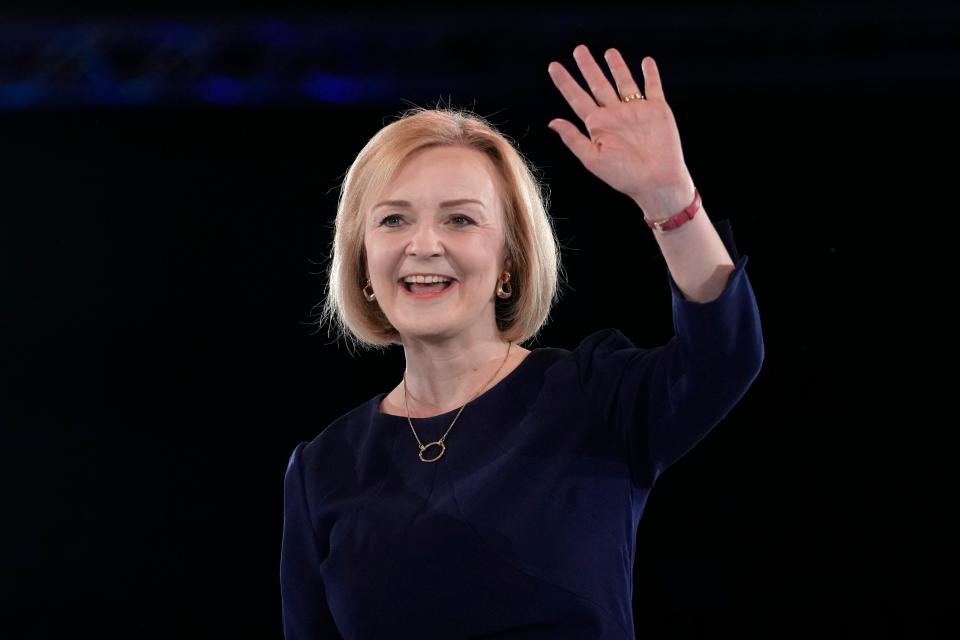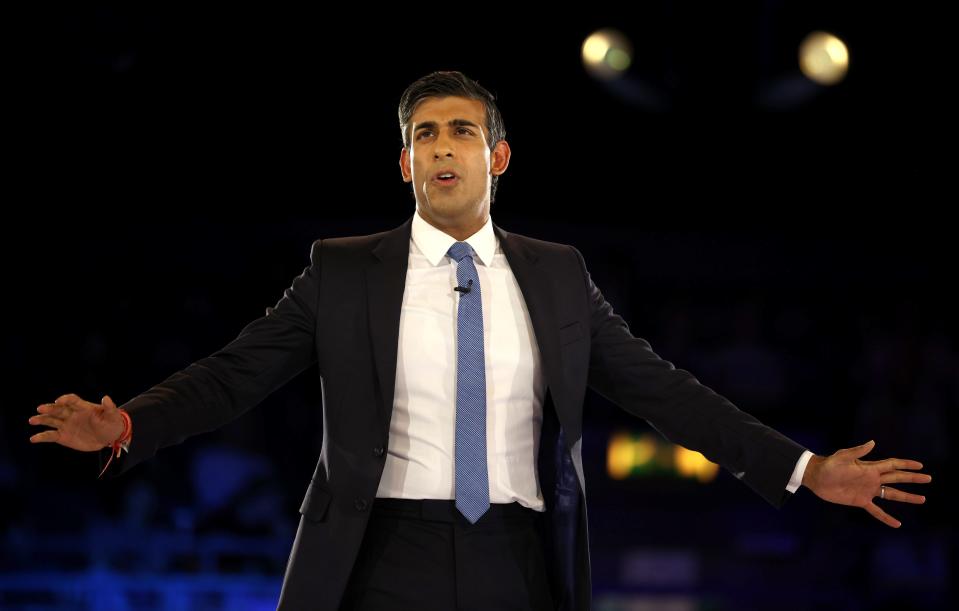What to know about Liz Truss, the outgoing UK prime minister who had shortest tenure in history
- Oops!Something went wrong.Please try again later.
- Oops!Something went wrong.Please try again later.
- Oops!Something went wrong.Please try again later.
- Oops!Something went wrong.Please try again later.
- Oops!Something went wrong.Please try again later.
LONDON – Liz Truss always portrayed herself as the next Margaret Thatcher.
But that effort fell far short when Truss, 47, resigned Thursday, becoming the shortest-serving leader in British political history after less than two months into the job.
Truss, 47, aimed to be the political heir to Thatcher, Britain's formidable cheerleader for free markets and low taxes, a strong supporter of the Anglo-American alliance and a dynamo who played a key role in ending the Cold War. Johnson, an architect of Britain's exit from the European Union (known as Brexit), held the role for just over three years before resigning amid scandals over breaking his own coronavirus lockdown rules.
Truss was foreign secretary in Johnson's government.
U.K. politics: Liz Truss to be Britain's new prime minister, replacing Boris Johnson. Job one: tackle inflation.

Liz Truss: Who is she?
Truss was Britain's third prime minister in a little over three years, and also its third female leader after Thatcher (1979-1990) and Theresa May (2016-2019).
Truss beat Rishi Sunak, who served in Johnson's government as finance minister, after a weeks-long internal Conservative Party selection contest. In Britain, voters elect a party, not a specific leader, giving the government in power latitude to swap in a new prime minister. Truss won 57% of votes cast by about 172,000 eligible grassroots Conservative Party members, or less than 1% of the U.K.'s population of 67 million. Sunak won 43% of the vote.
As foreign secretary, Truss was an ardent supporter of applying maximum pressure on Russia over its war in Ukraine by supplying Kyiv with weapons and through sanctions. She also supported Johnson's push to introduce legislation that would overturn rules, triggered by Brexit, that govern Northern Ireland's trading arrangements with Ireland. Northern Ireland is part of the U.K.; Ireland remains in the EU bloc.
During her campaign, Truss dodged a reporter's question over whether former President Donald Trump was a friend or foe to Britain. She also said the "jury is out" on Emmanuel Macron, France's leader.
In his farewell speech as prime minister, Boris Johnson compared himself to Roman statesman Lucius Quinctius Cincinnatus, a legendary military leader in the early days of the Roman Republic. Cincinnatus was a symbol of civic virtue. He resigned from power only to return to it later on. It could be a coded reference to Johnson's ambition to one day lead the country again. He will remain a lawmaker. Johnson added that he was "like a booster rocket" that's "fulfilled its function."
What happened when Truss took over as prime minister?
Sept 6. was the final day of Johnson's premiership. As part of the formal handover of power, Queen Elizabeth received Johnson and Truss at Balmoral, her summer estate in Scotland, on Tuesday, Buckingham Palace said. It is a break from tradition; usually the queen would host the departing and new British leaders at her London residence, which she has done 15 times during her 70-year reign.
From Parliament to mayor to PM: A timeline of Boris Johnson's political career
The then-monarch, 96, had participated in fewer royal duties. She was in increasingly frail health and had mobility problems. The moment the queen formally greets the new prime minister is known as the "kissing of hands" – though unlike what is seen in movies and TV shows, no kneeling or kissing takes place.
Questions about what to do about Britain's fragile economy dominated the leadership contest. Truss's first task as prime minister was to reassure the British public that she had a credible plan to deal with spiraling energy costs that could see bills for a typical household could reach more than $7,700 early next year, according to Britain's energy regulator. That's more than many pay for rent or a mortgage and comes on top of surging costs of fuel, food and other goods.
What did they say then about Truss
Truss addressed the British public on Sept. 5. In a brief acceptance speech on Monday, she thanked Johnson: "Boris, you got Brexit done. You crushed Jeremy Corbyn, you rolled out the vaccine. And you stood up to Vladimir Putin. You were admired from Kyiv to Carlisle." Johnson congratulated Truss on Twitter, saying "she has the right plan to tackle the cost of living crisis."
"Truss plainly wishes to be heir to Thatcher, not May, who was forced from office after failing to unite a fractious Conservative Party over Brexit. But to do so she would first have to banish Johnson to outer darkness, as Thatcher did with her predecessor, Edward Heath," Peter Kellner, a political expert and former president of polling firm YouGov, wrote on the website of Carnegie Europe, a Brussels-based public policy think tank. "Secondly, Truss would have to junk her economic strategy (which calls for sweeping tax cuts). Thatcher was obsessed with the public finances. The notion of unfunded tax cuts appalled her."
Tim Bale, a professor of politics at Queen Mary University of London, said few substantive changes to the U.S.-U.K. relationship were likely as a result of Britain's new prime minister. However, Bale said, one "bone of contention" could arise if Truss "takes a hard line on amending rules at Northern Ireland's border," which the Biden administration views as a threat to the peace between Ireland and Northern Ireland.
“To make genuine progress in increasing global security, the U.K. will need to examine how it can contribute to bringing about meaningful change in Russia," said James Nixey, director of the Russia program at Chatham House, a London-based think tank. "That will take leadership and political will of a degree rarely permitted in British politics.”
Why Truss taking over as prime minister mattered
The close diplomatic and security alliance between the U.S. and U.K. is viewed as a bipartisan issue that reflects decades of close cooperation. No matter who is prime minister, and no matter which party is in power – on either side of the Atlantic – that is unlikely to change. On all the major geopolitical topics of the day, such as China-related security matters, the Iran nuclear deal, and pressuring Russia over its war in Ukraine, there is broad agreement on how to tackle those questions.
The influence of Britain's new leader probably will be most keenly felt on Britain's failing economy. Inflation is predicted to reach 13% by October, according to the Bank of England. Electricity and heating bills are rising so quickly that economists and watchdog groups are warning that millions could be pushed into "fuel poverty" this winter. Truss has vowed to address rising household bills with tax cuts, though it's not clear whether those cuts would adequately address Britain's worst cost-of-living crisis in decades. "This is a national crisis, on the scale we saw in the pandemic," Martin Lewis, a financial journalist and consumer advocate, told the BBC recently. "We are currently in that position where we are watching the beds in European hospitals and doing nothing about it," a reference to allegations that Johnson did not take swift action during the coronavirus pandemic.
Want to know more? Here's what you missed
Liz Truss to be Britain's new prime minister, replacing Boris Johnson: Job one: Tackle inflation

This article originally appeared on USA TODAY: What to know about Liz Truss, the outgoing UK prime minister

